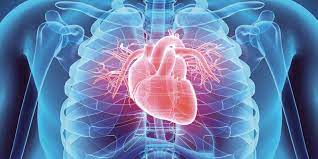Effective Techniques for Stress and Anxiety Management to Enhance Heart Health.

Effective Techniques for Stress and Anxiety Management to Enhance Heart Health.
Effective Techniques for Stress and Anxiety Management to Enhance Heart Health. Stress and anxiety are becoming common problems for a lot of people in today’s hectic and demanding society. Most people might not be aware of the significant effects of ongoing stress and strain on heart health, though. Since there is a strong correlation between these psychological elements and the onset of cardiovascular diseases, stress management must be given top priority if we want to protect our hearts.
The Relationship Between Heart Health, Anxiety, and Stress
The “fight-or-flight” reaction is triggered by stress and anxiety, which causes the body to release stress chemicals like cortisol and adrenaline. These hormones overwork the cardiovascular system by raising blood pressure, heart rate, and the risk of blood clotting. Chronic stress can eventually lead to the development of heart disease, hypertension, and heart attacks, among other heart diseases.
The American Heart Association found that those who experience high levels of ongoing stress and anxiety are far more likely to acquire cardiovascular disease. Moreover, stress-related habits like smoking, obesity, and inactivity might raise the risk even more. As a result, developing efficient coping mechanisms for stress and anxiety is essential, ultimately improving our cardiac health.
Practice Good Techniques for Handling Stress and Anxiety Exercises for Deep Breathing
Deep breathing techniques, such box and diaphragmatic breathing, have been demonstrated to promote relaxation and lower levels of tension and anxiety. These methods entail breathing slowly and deeply while paying close attention to the whole exhalation and inhalation. Deep breathing reduces blood pressure, slows the heart rate, and fosters tranquility by activating the parasympathetic nervous system.
To engage in deep breathing exercises, locate a peaceful area and take a comfortable seat or lie down. Shut your eyes and inhale deeply through your nose, letting your belly swell to its utmost capacity.
Exercise Frequently
Exercise is crucial for controlling stress and anxiety in addition to helping one maintain a healthy weight and cardiovascular fitness. Exercise causes the brain to release endorphins, which are organic mood enhancers. Regular exercise also aids in lowering stress hormone levels, such as cortisol and adrenaline, which enhances relaxation and a feeling of well-being.
Aerobic workouts, cycling, swimming, running, and brisk walking are all excellent ways to relieve stress and improve blood flow to the brain. To get the benefits of stress relief, try to get in at least 30 minutes of moderate-intensity exercise most days of the week. However, before beginning any new workout regimen, make sure to pick things that you love doing and speak with your doctor.
Engage in meditation and mindfulness practices.
Being mindful entails focusing on the here and now while letting go of judgment. We can teach the mind to examine ideas and feelings without becoming caught up in them by practicing mindfulness. This exercise encourages inner peace and mental health by interrupting the vicious cycle of tension and anxiety.
One specific method for achieving mindfulness is meditation. Meditation serves to quiet the mind, lessen anxiety, and develop self-awareness by having one’s attention fixed on the breath or an object while sitting quietly. Frequent meditation has been linked to better cardiovascular health, reduced stress, and anxiety.
There are numerous tools and applications available to help you include mindfulness and meditation in your daily practice. These include applications for guided meditation such as Headspace and Calm, which offer detailed instructions and a variety of meditation
Sustain Appropriate Nutrition and Diet
The food we eat has a big impact on our general wellbeing, which includes how well we handle stress and anxiety. Some foods can exacerbate the symptoms of anxiety and stress, such as those that are heavy in sugar, refined carbs, and saturated fats. Conversely, a healthy diet rich in nutrients can have a beneficial effect on stress levels and mood.
Include foods high in complex carbohydrates—found in whole grains, legumes, and fruits—in your diet to help you cope with stress. The synthesis of serotonin, a neurotransmitter linked to emotions of wellbeing, is elevated by these carbohydrates. Consuming a range of vibrant fruits and vegetables should be your main goal because they are packed with phytochemicals and antioxidants that improve general health and lessen oxidative stress.
Make Time for Good Sleep a Priority
A healthy sleep schedule that includes stress and anxiety reduction is essential for both mental and physical health. Prolonged sleep deprivation can lead to elevated levels of stress hormones, compromised cognitive abilities, and emotional upheavals. Furthermore, a lack of sleep has been repeatedly associated with a higher chance of cardiovascular disease development.
Create a sleep-friendly environment and adopt a calming nighttime ritual to enhance the quality of your sleep. Establish regular bedtimes and wake-up times, and refrain from using electronics just before bed. Before going to bed, the mind can be calmed by using relaxation techniques including deep breathing, meditation, or reading. To find and address underlying problems, it is advised to speak with a healthcare provider if sleep disruptions continue.




